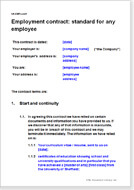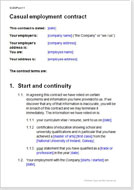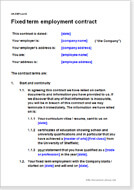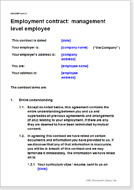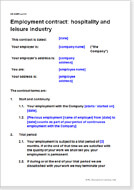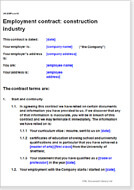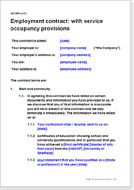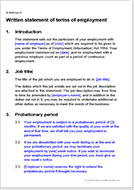Employment contracts
Many of the clauses in employment contracts are required by law, making one document likely to be very similar to another, even for a different role in a different industry. Look at our standard contract first (suitable for most employees), then decide whether you need the additional provisions that the other versions contain. We also have a selection of job specific agreements so as to save you time customising a template.
Employment contract: standard for any employee
Employment contract or Employee agreement is a complete contract that records the rights and responsibilities the business and employee have towards each other. From a legal perspective, it gives strong protection for both the employer and a fair, transparent deal for the employee.
The document can be used for an employee:
- in any position below company director level
- full time, part time or temporary
The contract is suitable for any type of organisation.
Casual employment contract
This is a comprehensive employment contract for casual workers that complies with The Employment (Miscellaneous Provisions) Act 2018. Zero hours are no longer allowed by law. Instead, this agreement provides the employee with a range of hours for which he or she is expected to work. It also covers all the legal requirements for information to be given to an employee.
Fixed term employment contract
A comprehensive employment contract for any organisation that employs staff on fixed term contracts, whether for projects, seasonal increases in work or to cover full-time employees on leave. It is a superb framework for fair, full and easily understood protection of the employer and compliance with organisational requirements.
Employment contract: management level employee
A comprehensive employment contract for managers or other senior level staff who are not company directors. It can be used in organisations of any type, any business and any size.
Employment contract: hospitality and leisure industry
A comprehensive contract of employment suitable for staff working in pubs, bars and restaurants, at events, receptions or parties, or otherwise in the hospitality and leisure industry. This employment contract provides for unsociable hours, producing and serving food and alcoholic drinks, travel to different locations to work, flexible working, and restraint of competitive trading. It is suitable for any level of staff below the top level of management.
Employment contract: construction industry
A complete employment contract suitable for all staff working in construction sector. The contract provides strong protection for the employer organisation.
Employment contract: with service occupancy provisions
An employment contract that includes provision for service occupancy - that is where the employee is required to live on business premises in order to perform the job. Example roles would be: caretaker, school housemaster, hotel staff, care industry staff, nanny or other household staff. The contract provides strong protection for the employer.
Written statement of terms of employment
Official statement of terms containing key provisions regarding the agreement to be provided to an employee when they start working as an employee.

If the document isn’t right for your circumstances for any reason, just tell us and we’ll refund you in full immediately.

We avoid legal terminology unless necessary. Plain English makes our documents easy to understand, easy to edit and more likely to be accepted.

You don’t need legal knowledge to use our documents. We explain what to edit and how in the guidance notes included at the end of the document.

Email us with questions about editing your document. Use our Lawyer Assist service if you’d like our legal team to check your document will do as you intend.

Our documents comply with the latest relevant law. Our lawyers regularly review how new law affects each document in our library.
What is an employment contract?
An employment contract (also known as an employment agreement, contract of employment, or employee contract) sets out the employment conditions and the rights, responsibilities, and duties of the employer and the employee as agreed between them.
What should be included in an employment agreement?
Employee and employer relationships are regulated in two ways: through contractual terms and by statutory law.
Employment rights and responsibilities
Employment law provides the minimum level of employment rights guaranteed to each employee.
These include, amongst others: the right to be granted the National Minimum Wage, breaks during working hours, annual leave, statutory sick pay, holiday pay, maternity leave, maternity pay, a maximum working week, right to disconnect and equal treatment. notice period and safety at workplace.
If any term of the employee contract reduces the right granted to the employee by statutory law, that term will not be enforceable by a court or Workplace Relations Commission (e.g. if the employee contract grants a wage lesser than the National Minimum Wage or does not grant statutory sick pay to the employee).
However, the employer can grant further rights if the employer desires to do so (such as a greater annual leave pay) in the contract of employment.
Therefore, it is pertinent for employers and employees both to know what an employee contract can and cannot cover.
Note: The Organisation of Working Time Act 1997 states that the maximum average working week for many employees cannot exceed 48 hours. This does not mean that a working week can never exceed 48 hours, it means that your average weekly hours over a 4-month period should not exceed 48 hours. For more information, please visit Citizen's Information
Statement of terms of employment
To be compliant with the Employment (Miscellaneous Provisions) Act 2018, an employer must provide a written statement of five core terms within 5 days of starting the job (also known as statement of terms and conditions) to all new hires.
This contract of employment serves to make the new employee aware of certain important employment terms including:
- the full names of employer and employee
- the address of the employer
- the job title
- the duration of the contract (temporary or fixed)
- the probationary period (if any)
- the rate or method of calculation of the employee’s renumeration
- the pay reference period for the purposes of National Minimum Wage Act 2000
- the number of hours which the employer expects the employee to work
- the pay period (how often the employee will be paid)
- the notice period
- how overtime pay is calculated
- the termination date (for fixed term contracts)
The employer must provide a written statement of the remaining express terms of employment within 2 months of starting work, in accordance with the Terms of Employment (Information) Acts 1994.
These include information on applicable employment laws, trade union membership, collective agreements and work pensions, and are often placed in an employee handbook (see below).
Organisational policies and procedures
Other policies and procedures that are not required to be provided in a written statement of particulars (such as data protection and disciplinary and grievance procedures) could be included in the employee's contract.
However, especially when you have many employees, changing each contract (and ensuring consistency between employees) every time a new law changes can be time consuming and difficult.
Therefore, it is usual to place all procedures and policies common to all staff (including such things as general holiday entitlement, notice periods for paid leave, pension scheme membership and grievance procedures) in an employee handbook and refer to the handbook in the employee contract.
Our contract of employment templates
Each Net Lawman document is a complete contract, covering the terms required to comply with the employment law and also provisions to further protect your business that many employee contract templates do not contain.
Using one, you'll be able to create your own employment contract for your own business without needing to navigate extensive employment law.
When you download your employment contract template, it will be in Microsoft Word format. So you will have no trouble editing the document to fit your needs.
Further terms in our employee contract templates protect your business from, for example: purposeful or accidental intellectual property theft; and that reduce the likelihood of ever being called to court by disgruntled employees.
Comply with current law and recommended practices
Our employee contract templates are completely up-to-date with the latest law (the governing law being that of the Republic of Ireland).
We also follow current best practice recommendations by the Workplace Relations Commission and other employment bodies.
Easy to understand and edit
We use plain English and modern language throughout our contract of employment templates.
Doing so makes clear your expectations for your employee without reducing the legal effect of a document. It has the additional advantage of making editing easy.
Details such as the employee's job title, employee duties and training provisions can be added in our employee contract templates if required, either within the existing text, or by reference to a job description.
You can amend employment terms in our documents to cater to a change in circumstances, provided the written consent of both parties is available.
Suitable for all businesses and organisations
Our employee contract templates can be used by any type of organisation (including companies, charities, trusts, partnerships, and governmental organisations) of any size and in any industry.
They are suitable for use when:
- hiring any new employee
- updating existing contracts that do not comply with the latest law
and for:
- any level of employee (we provide fuller contracts for senior staff)
- permanent employees (full or part time employee) and temporary employees (such as casual or seasonal workers)
Why is it important to have a written employment agreement?
Providing written terms of employment is a legal requirement.
An employment contract, written or verbal is made as soon as the employee accepts a job offer.
To minimise future misunderstandings, we recommend providing a written contract with the offer letter so that the new employee can return an acceptance letter with a signed copy of the employee contract.
- Employer’s duty of care towards the employees
- Employer’s duty to provide work
- A particular rate of overtime pay for employees
- The employee will do the work in a competent and careful manner.
Different types of employee agreements
There are several different employment types. Each requires a slightly different document.
Permanent employee
A permanent employee can be either part or full-time. A permanent employees’ employment continues for an indefinite duration unless the employee contract is terminated by either party. If you want to hire a permanent employee, you can use our standard employment agreement.
Fixed term employee
A fixed-term employee is a person whose contract is due to end when a specified event does or does not happen or when a specified task has been completed. For hiring fixed term employees, use our fixed term agreement.
Causal employee
Causal employees are hired by employers on an ad hoc basis without any guarantee of continuous employment or a certain number of work hours. If you require a causal worker, use our casual employment contract template.
Would highly recommend this service to everyone.
Thank you
All rights reserved

